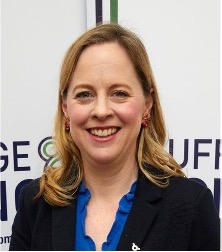Bioelectronic tools to study the gut-brain axis
22nd February 2023
Timing : 1 pm EST
Please use this zoom link for joining the webinar
For a list of all talks at the NanoBio seminar Series Spring'23, see here
Dr. Róisín M. Owens
Professor of Bioelectronics
Department of Chemical Engineering and Biotechnology
University of Cambridge
Róisín M. Owens is Professor of Bioelectronics at the Dept. of Chemical Engineering and Biotechnology in the University of Cambridge and a Fellow of Newnham College. She received her BA in Natural Sciences (Mod. Biochemistry) at Trinity College Dublin, and her PhD in Biochemistry and Molecular Biology at Southampton University. She carried out two postdoc fellowships at Cornell University, on host-pathogen interactions of Mycobacterium tuberculosis in the dept. of Microbiology and Immunology with Prof. David Russell, and on rhinovirus therapeutics in the dept. of Biomedical Engineering with Prof. Moonsoo Jin. From 2009-2017 she was a group leader in the dept. of bioelectronics at Ecole des Mines de St. Etienne, on the microelectronics campus in Provence. Her current research centers on application of organic electronic materials for monitoring biological systems in vitro, with a specific interest in enhancing the biological complexity and adapting the electronics to be fit for purpose. She has received several awards including the European Research Council starting (2011), proof of concept grant (2014) and consolidator (2016) grants, a Marie Curie fellowship, and an EMBO fellowship. She currently serves as co-I and co-director for the EPSRC CDT in Sensor Technologies, renewed in 2019. She is a 2019 laureate of the Suffrage Science award. From 2014-2020, she was principle editor for biomaterials for MRS communications (Cambridge University Press), and she serves on the advisory board of Advanced BioSystems and Journal of Applied Polymer Science (Wiley). In 2020 she became Scientific Editor for Materials Horizons (RSC). She is author of 100+ publications and 2 patents and her work has been cited more than 6000 times
Professor of Bioelectronics
Department of Chemical Engineering and Biotechnology
University of Cambridge
Róisín M. Owens is Professor of Bioelectronics at the Dept. of Chemical Engineering and Biotechnology in the University of Cambridge and a Fellow of Newnham College. She received her BA in Natural Sciences (Mod. Biochemistry) at Trinity College Dublin, and her PhD in Biochemistry and Molecular Biology at Southampton University. She carried out two postdoc fellowships at Cornell University, on host-pathogen interactions of Mycobacterium tuberculosis in the dept. of Microbiology and Immunology with Prof. David Russell, and on rhinovirus therapeutics in the dept. of Biomedical Engineering with Prof. Moonsoo Jin. From 2009-2017 she was a group leader in the dept. of bioelectronics at Ecole des Mines de St. Etienne, on the microelectronics campus in Provence. Her current research centers on application of organic electronic materials for monitoring biological systems in vitro, with a specific interest in enhancing the biological complexity and adapting the electronics to be fit for purpose. She has received several awards including the European Research Council starting (2011), proof of concept grant (2014) and consolidator (2016) grants, a Marie Curie fellowship, and an EMBO fellowship. She currently serves as co-I and co-director for the EPSRC CDT in Sensor Technologies, renewed in 2019. She is a 2019 laureate of the Suffrage Science award. From 2014-2020, she was principle editor for biomaterials for MRS communications (Cambridge University Press), and she serves on the advisory board of Advanced BioSystems and Journal of Applied Polymer Science (Wiley). In 2020 she became Scientific Editor for Materials Horizons (RSC). She is author of 100+ publications and 2 patents and her work has been cited more than 6000 times
